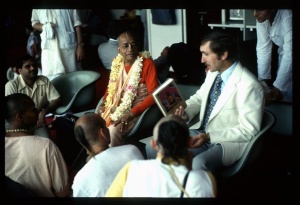CC Madhya 15.156 (1975): Difference between revisions
(Vanibot #0027: CCMirror - Mirror CC's 1996 edition to form a basis for 1975) |
(Vanibot #0020: VersionCompareLinker - added a link to the Version Compare feature) |
||
| Line 2: | Line 2: | ||
<div style="float:left">'''[[Sri Caitanya-caritamrta (1975)|Śrī Caitanya-caritāmṛta (1975)]] - [[CC Madhya (1975)|Madhya-līlā]] - [[CC Madhya 15 (1975)|Chapter 15: The Lord Accepts Prasādam at the House of Sārvabhauma Bhaṭṭācārya]]'''</div> | <div style="float:left">'''[[Sri Caitanya-caritamrta (1975)|Śrī Caitanya-caritāmṛta (1975)]] - [[CC Madhya (1975)|Madhya-līlā]] - [[CC Madhya 15 (1975)|Chapter 15: The Lord Accepts Prasādam at the House of Sārvabhauma Bhaṭṭācārya]]'''</div> | ||
<div style="float:right">[[File:Go-previous.png|link=CC Madhya 15.155 (1975)|Madhya-līlā 15.155]] '''[[CC Madhya 15.155 (1975)|Madhya-līlā 15.155]] - [[CC Madhya 15.157 (1975)|Madhya-līlā 15.157]]''' [[File:Go-next.png|link=CC Madhya 15.157 (1975)|Madhya-līlā 15.157]]</div> | <div style="float:right">[[File:Go-previous.png|link=CC Madhya 15.155 (1975)|Madhya-līlā 15.155]] '''[[CC Madhya 15.155 (1975)|Madhya-līlā 15.155]] - [[CC Madhya 15.157 (1975)|Madhya-līlā 15.157]]''' [[File:Go-next.png|link=CC Madhya 15.157 (1975)|Madhya-līlā 15.157]]</div> | ||
{{CompareVersions|CC|Madhya 15.156|CC 1975|CC 1996}} | |||
{{RandomImage}} | {{RandomImage}} | ||
==== TEXT 156 ==== | ==== TEXT 156 ==== | ||
| Line 25: | Line 24: | ||
<div class="translation"> | <div class="translation"> | ||
"In this way, I congratulated Murāri Gupta, saying, 'Indeed, you are the incarnation of Hanumān. Consequently you are the eternal servant of Lord Rāmacandra. Why should you give up the worship of Lord Rāmacandra and His lotus feet?' " | |||
</div> | </div> | ||
Latest revision as of 08:54, 27 January 2020
Śrī Caitanya-caritāmṛta (1975) - Madhya-līlā - Chapter 15: The Lord Accepts Prasādam at the House of Sārvabhauma Bhaṭṭācārya

His Divine Grace
A.C. Bhaktivedanta Swami Prabhupada
A.C. Bhaktivedanta Swami Prabhupada
TEXT 156
- sākṣāt hanumān tumi śrī-rāma-kiṅkara
- tumi kene chāḍibe tāṅra caraṇa-kamala
SYNONYMS
sākṣāt—directly; hanumān—Hanumān; tumi—you; śrī-rāma-kiṅkara—the servant of Śrī Rāma; tumi—you; kene—why; chāḍibe—should give up; tāṅra—His; caraṇa-kamala—lotus feet.
TRANSLATION
"In this way, I congratulated Murāri Gupta, saying, 'Indeed, you are the incarnation of Hanumān. Consequently you are the eternal servant of Lord Rāmacandra. Why should you give up the worship of Lord Rāmacandra and His lotus feet?' "